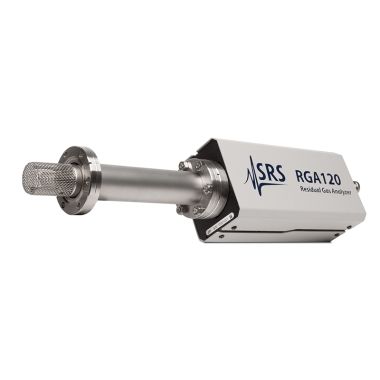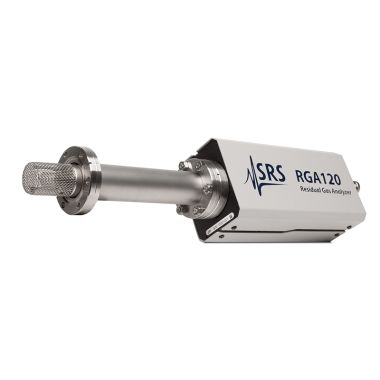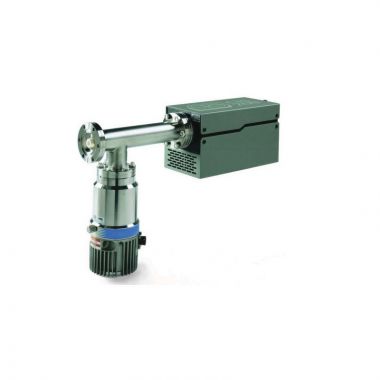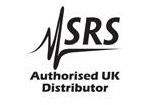SRS RGA300 Residual Gas Analyser
- 300 amu system
- Better than 1 amu resolution
- 6 decades of dynamic range
- 5E14 Torr detection limit
- RGA Windows & LabVIEW software
- Field-replaceable filament (electron multiplier optional)
- RS-232 interface
- 24VDC input (240VAC optional)
Lambda Exclusive Promotion:
Additional 12 months warranty for free (2 years total) via our UK Service Centre.
The Stanford Research Systems RGA100, RGA200 and RGA300 amu residual gas analysers from SRS offer exceptional performance and value. These RGAs provide detailed gas analysis of vacuum systems at about half the price of competitive models. Each RGA system comes complete with a quadrupole probe, electronics control unit (ECU), and a real-time Windows software package that is used for data acquisition and analysis, as well as probe control.
Rugged Probe Design
The probe consists of an ionizer, quadrupole mass filter, and a detector. The simple design has a small number of parts which minimizes out gassing and reduces the chances of introducing impurities into your vacuum system. The probe assembly is rugged and mounts onto a standard 2.75" Conflat flange. It is enclosed within a stainless steel tube, with the exception of the ionizer which requires just 2.5" of clearance in your vacuum system - about that of a standard ion gauge. The probe is designed using self-aligning parts so it can easily be reassembled after cleaning.
Compact Electronics Control Unit
The densely packed ECU contains all the necessary electronics for controlling the RGA head. It is powered by either an external +24 VDC (2.5 A) power supply or an optional, built-in power module which plugs into an AC outlet. LED indicators provide instant feedback on the status of the electron multiplier, filament, electronics system and the probe. The ECU can easily be removed from the probe for high-temperature bake outs.
Unique Filament Design
A long-life, dual thoriated-iridium (ThO2/Ir) filament is used for electron emission. Dual ThO2/Ir filaments last much longer than single filaments, maximising the time between filament replacements. Unlike other designs, SRS filaments can be replaced by the user in a matter of minutes.
Continuous Dynode Electron Multiplier
A Faraday cup detector is standard with all SRS RGAs, allowing partial pressure measurements from E5 Torr to 5E-11 Torr. For increased sensitivity and faster scan rates, an optional electron multiplier is offered that detects partial pressures down to 5E-14 Torr. This state-of-the-art, multi-channel, continuous-dynode electron multiplier (EM) offers increased longevity and stability, and can also be replaced by the user - a first for RGAs.
Useful Features
SRS RGAs have a built-in degassing feature. Using electron impact desorption, the ion source is thoroughly cleaned, greatly reducing the ionizer’s contribution to background noise.
A firmware driven filament protection feature constantly monitors (675Hz) for over pressure. If over pressure is detected, the filament is immediately shut off, preserving its life.
Complete Programmability
Communication with computers is made via the RS-232 interface. Analogue and histogram (bar) scans, leak detection, and probe parameters are all controlled and monitored through a high-level command set. This allows easy integration into existing programs.
RGA Windows Software
The RGA systems are supported with a real-time Windows software package that runs on PCs. The intuitive graphical user interface allows measurements to be made quickly and easily. The program is fully interactive, giving the user complete control of the graphical display. Screens can be split for dual-mode operation, scales can be set to linear or log format, and data can be scaled manually or automatically.
Data is captured and displayed in real time or scheduled for acquisition at a given time interval for long-term data logging.
Features include user-selectable units (Torr, mbar, Pa and A), programmable audio and visual alarms, and comprehensive on-line help.
The software also allows complete RGA head control with easy mass scale tuning, sensitivity calibration, ionizer setup, and electron-multiplier gain adjustment. For further analysis, data files can be saved in ASCII format for easy transfer into spreadsheets. Graphic images can be saved as META files or copied to the clipboard for importing directly into other Windows programs. The software also provides password protection for locking out head parameters so that casual users can’t alter important settings. A LabVIEW driver is also available on the SRS website.
An optional stand-alone monitor (PPM100) can be used to control the RGA without a host computer.
Multi-Head Operation
The software supports multiple head operation when more than one RGA is needed. Up to eight ECUs can be monitored from the software.
Performance and Value
The SRS family of RGAs is ideal for applications involving gas analysis, leak detection, and vacuum processing. We offer 100, 200 and 300 amu systems with supporting Windows software, and options that include an electron multiplier and a built-in power module for AC line operation.
|
Pressure vs. time presents a strip chart of partial pressures for selected masses and provides a complete time history of your data. Complete scrolling and zoom control is available even while data is being acquired. This mode is most often used for monitoring process trends. |
|
Leak detection mode monitors a particular mass number (not just helium) over time, and combines many features of the previous modes. A vertical bar graph provides a visual reference for viewing changes in intensity from a distance. A programmable audible tone, large numeric read-out, and visual alarm are also provided. |
|
Analogue mode provides a line graph representation of the acquired mass spectrum (partial pressure vs. mass number). Span, resolution and noise floor can each be set. Scans can be single-shot, timed or taken continuously. |
|
Histogram mode displays a bar graph of partial pressure vs. mass, allowing the spectrum to easily be interpreted. This mode is often used for quick and easy vacuum analysis. The screen can be split for viewing two modes of operation simultaneously. |
|
Table mode provides a readout of mass, scaling factor, and true partial pressure. The display shows the peak heights and alarm status of up to 10 masses. The electron multiplier can be independently set on or off for each mass. This allows the user to view minor species even in the presence of high total pressure. |
|
Library mode contains a comprehensive list of gases that can be used to compare against the current spectrum. A search mode allows you to select up to 12 masses and identify and display (numerically and graphically) the intensity of all gases that contain these masses. |
|
Analysis mode provides an approximation of the composition of gases being monitored by the RGA. Since more than one gas can contribute to a particular amu’s partial pressure, the analysis mode is extremely useful in determining the make-up of complex gases. Up to 12 common gases can be selected for the analysis. |
|
Multi-head operation is available when when more than one RGA is needed for analysis. Up to eight heads can be monitored simultaneously |
| Photo | Product | Price | |
|---|---|---|---|
 | SRS RGA100 Residual Gas Analyser | 4,709.00 | |
 | SRS RGA120 Residual Gas Analyser | 5,599.00 | |
 | SRS RGA220 Residual Gas Analyser | 6,564.00 | |
 | SRS RGA320 Residual Gas Analyser | 8,038.00 | |
 | SRS RGA200 Residual Gas Analyser | 6,088.00 | |
 | SRS PPM100 Partial Pressure Monitor For RGA | 4,752.00 | |
 | SRS CIS100 Closed Ion Source Gas Analyser | 8,799.00 | |
 | SRS CIS200 Closed Ion Source Gas Analyser | > | |
 | SRS CIS300 Closed Ion Source Gas Analyser | > | |
 | SRS RGA Ethernet Adapter | > |





